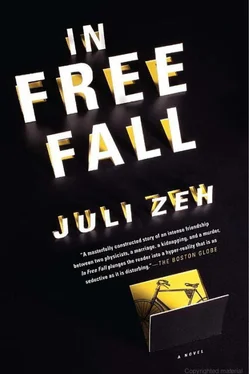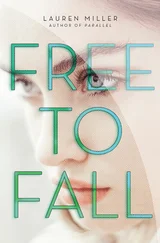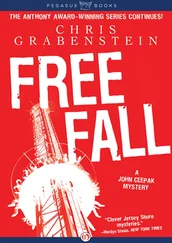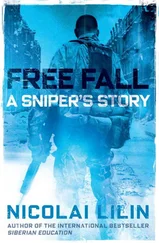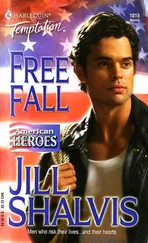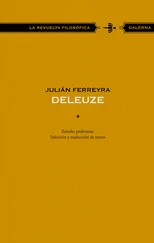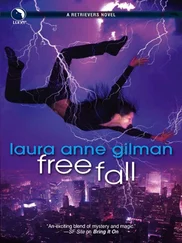“Not exactly,” Schilf says. “For me, the murderer is a great man, the kind of person we owe something to. I owe him a thorough investigation of this case. Anything else would destroy him.”
“But it’s your job to destroy the lives of murderers.”
“There are subtle differences.”
“The good policeman saves the poor criminal! Sounds romantic.”
The length of the telephone cable and the size of the apartment allow Schilf to reach the balcony door. The balcony is so small that there is barely room to stand. People only ever want to save themselves, the detective thinks. The difference lies in what they want to save themselves from.
“I would do everything I can to help this man,” Schilf says, “whether you believe it or not.”
“I believe you,” Julia says tenderly. She has interpreted his long silence correctly. “I believe everything you tell me. I have to, for structural reasons.”
“What do you mean?”
“Don’t you understand?”
“No.”
“I love you.”
The detective shakes his head involuntarily. There it is again, the notion that his life is completely out of control. The distant throbbing of a headache announces itself. Schilf suddenly thinks about Maike and realizes at the same time that he has skipped lunch and slept through dinner. He lights a cigarillo and inhales. The nicotine sets free a couple of endorphins somewhere in his body—he feels a slight dizziness and a gentle release. That’s what dying must be like, smoking a cigarillo on an empty stomach.
“So you’ll be staying a few more days,” Julia says.
“Looks like it.”
“Great. I’ll come to visit.”
“I’m not free tomorrow,” the detective says quickly. “I have to do something.”
“The day after tomorrow, then.”
A group of young people are walking in the street below, and their voices carry up to Schilf. Young men, rendered soft and bloated by the love of their mothers, and young women who have made up their eyelashes like spiders’ legs. They slap each other’s backs, tug each other along, lean over parked cars, staring into the dark interior. They seem aimless, incidental, a mere episode in history. At the sight of them, Schilf finds it hard to believe what human beings can achieve on this earth when they join forces. The females are still wearing shoes that are impossible to walk in.
“What would you say,” he asks his girlfriend, “if I had to go on a journey sometime soon? On my own?”
“Schilf,” Julia says, with an earnestness that takes the detective by surprise, “you haven’t asked me about my past. I won’t ask about your future. That’s what they call a deal.”
“OK,” Schilf says, using a word he detests, but which suits her “deal.” Perhaps life would be a circus tent, thinks the detective, if people had the right concepts. Concepts like rubber gloves, so you could touch things without getting your hands dirty. Julia has a lot of such concepts.
“OK,” he says again. “See you the day after tomorrow, then.”
They send kisses through their telephones, but Schilf purses his lips clumsily and makes smacking noises that are far too loud. He puts the receiver down on the windowsill and finishes smoking his cigarillo. The monotonous beep of the busy signal blends with the darkness. His inner observer has not said a word during the entire conversation with Julia. A wave of exhaustion that the detective cannot explain sweeps over him, and he decides to go back to bed.
THE SUN HAS SET INTO THE HAZE OVER THE CITY, and has taken with it not only the light but the heat of the day. Night has come out of its hiding place at the bottom of the lake more quickly than usual, and crept into the lanes. It is cool and humid, as if summer is ending today. The air already smells of poorly lit pavements, hunched shoulders, and damp hats.
Maike’s car is parked near the lake. Sebastian is sitting behind the steering wheel, trying to imagine where he will be in the winter. What he will look like then, what he will be eating, whom he will be talking to, and about what. He can’t imagine it. He remembers the feeling of never being able to think beyond the next couple of hours because every day held the possibility of turning him into someone else altogether: that was how he lived as a child. At the time, he felt so at home in the present that it seemed normal to him that it was not time passing but he himself. Although that was a happy state of being, Sebastian is not thrilled to have lost his future in his early forties. For a grown-up, the absence of time is clearly a kind of homelessness.
He looks out over the black expanse of the water, which reflects the lights on the promenade. He has not chosen to stop here; he is simply stranded, with no strength left for the next step. He could take out his mobile phone and look in the address book for a number that naturally he has long known by heart. Or turn on the engine and take the familiar route to a certain apartment. Or take the key out of the ignition, get out of the car, walk along the Quai des Eaux-Vives, and then drive back home.
Since leaving Freiburg and the horror of the last few days behind him, he has been in the grip of an exhaustion that feels like the flu. The symptoms are similar: burning eyes, a scratchy throat, and aching limbs. Sebastian barely knows how he has managed to get here, let alone why he has come in the first place. When he closes his eyes, the autobahn zooms through his head with unrelenting speed. The windshields of the cars in the oncoming lane are flecked with the pink of the evening sky to the north. Wilted sunflowers beside the autobahn turn their faces down toward the earth into which they will soon sink.
The car swerved a few times on the way here. Sebastian breathed more quickly and pinched his thigh. Because nothing helped, he thought of Dabbelink. He led himself through a series of scenes depicting blood, bones, and bicycle parts, all captioned: “This is what I did.” The effect was weaker than expected, a twitch in the stomach that was barely enough to keep his eyes on the road for five minutes. The more he tried, the less it worked. After fifty kilometers, the memory of Dabbelink left him completely cold.
Now he knows why murderers like to return to the scene of the crime, as the detective novels maintain. It is not the irresistible lure of evil, nor a desire for atonement or the secret hope of being arrested on the spot. It is their inability to believe that the murder has actually happened. A murderer returns to the scene of the crime so as not to continue thinking of the victim as a living person. If Sebastian could turn back the clock, he would not undo Dabbelink’s murder. He did it to save Liam, and he is sure that he would have done plenty of other things merely for the illusion of saving Liam. But he would not leave the scene of the crime without having looked for the remains of his victim.
Sebastian realizes that even a minor player like Dabbelink cannot be shoved off the stage without consequences. He knows that he is lost. But this knowledge is suspended in midair as long as he thinks of his crime in terms of television images. Everything that awaits him—arrest, a torturous murder trial, perhaps a prison sentence, the loss of his family—his future misery seems to have arisen from another world altogether, a world that has no rightful claim on him. Whoever does not believe what he has done is in no position to understand what is happening to him and around him. The best thing about being at Lake Geneva is that it prevents him from pounding on the doors of the forensic department of the Freiburg police, demanding to see the head of his victim.
As if something had been decided with this realization, Sebastian starts the engine and turns the car around.
Читать дальше
